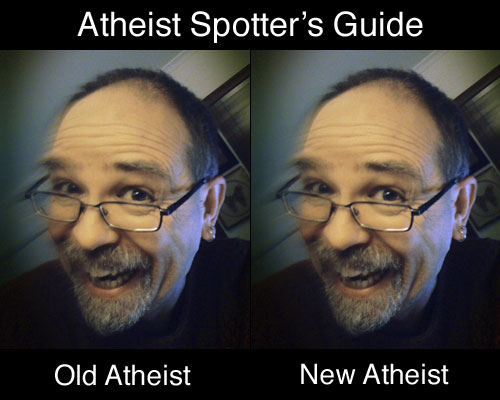Sun 19 Oct 2014
Everything Old is New Again
Posted by anaglyph under Atheism
[2] Comments

Back in November 2006, a writer named Gary Wolf first coined the term New Atheism in an article in Wired. It is truly irritating that he did so, ((But probably inevitable that a term like it would have arisen anyway.)) since it has these days become a kind of target at which religious apologists of all flavours seem to very much enjoy taking aim.
Let’s reflect on it for a moment: the conjuring of an idea like a ‘new’ atheism logically demands, of course, that there must be a corresponding concept of an ‘old’ atheism. The vehemence with which many religious writers attack the so co-called New Atheism – as if it’s a ‘thing’ – carries a subtlety that I think a lot of people miss: that it is somehow different to, and less desirable than, the old version. What we have here is a tacit acceptance in modern religious thought that atheism was actually preferable in the old days.
Which is weird, don’t you think?
So, what, exactly, has changed?
It’s all about voices. For millennia the Church ((When I say ‘the Church’ in most contexts on TCA, you should take it to mean ‘all conventional kinds of religion that command large numbers of followers’.)) has had the loudest voice in town ((Well, possibly second to money, but hey.)) but in recent times, the voice of atheism has become louder and stronger, and more people are hearing it. Religions really don’t like that. They preferred it when atheists were meek and quiet and stayed in their university cloisters (because that’s where they mostly were) and weren’t heard by too many. The objection here, then, is not to atheism itself, but instead to an atheism that people know about.
To this end, religious apologists find it advantageous to make a differentiation between ‘old’ and ‘new’ atheism and so they set about characterising the New Atheists in unpleasant terms. In other words, they contrive to make an old adversary, who was comfortably tolerated and conveniently insulated, into a different one: a newbie who is disagreeable, loud-mouthed and crass – and therefore, by inference, someone with little credibility and who you shouldn’t like. This has nothing to do with what atheists are actually saying, of course, but more to do with painting an unflattering picture of them. ((You will have spotted this as a very common logical fallacy: make people look bad so that you can make it seem that their point of view is bad – Poisoning the Well.))
New Atheists are, then, brash, opinionated, militant (whatever that means), ((From the first time I heard this adjective applied to atheism it really pissed me off. What the actual fuck does that mean – that atheist have guns and an army? It’s a highly coloured term that has one purpose and one purpose alone: to conjure up images of organized aggression, intolerance and domination by force. None of these objectives are ever promoted by the atheist community.)) narrow-minded and intolerant. Of course the majority of atheists don’t see themselves like this, so the term is viewed among atheists as completely daft. People like myself, who have identified as atheists for decades, don’t consider themselves as ‘new’ anything. We continue to hold the views that we’ve always held, and speak about them in the ways that we always have.
The significant difference, of course, is that now we have the internet we can quite easily circulate those views, make them public ((As I’m doing right now.)) and share them with others. But hey – so can the religiously convinced! So what then is the problem – status quo reclaimed, right?
Not so much.
What’s happening to religion at this point in the 21st century, is exactly the same thing that’s happening to all those institutions that control the conduits for the dissemination of intellectual property. I’ve talked about other contexts for that previously on the Cow, and this is no different. A record company or a movie studio or a newspaper controls the conduit for their intellectual property in order to make money out of those who comprise their audience. Religions control the conduit because this is how they perpetuate propaganda and stop adherents from getting information from elsewhere – information that just might conceivably make more sense than that which they themselves are peddling. That’s a massive risk for religion, because in the same way that this unfettered access to information is thoroughly wrecking the old edifices of intellectual property, it could (and probably would if given sufficient time, I think) completely disintegrate the stranglehold of religion on humanity.
To put it simply, religions are losing ground when it comes to controlling how people think. Since the Devil is kinda out of fashion these days, they desperately need somebody they can blame for this horribly destabilising state of affairs. No wonder they’re so keen to find a way to make us look bad.




Welcome back, Rev. Was it a Sabbatical Retreat?
It was a Sanity Retreat. Although hearing just now that the new head of the CSIRO believes in water divining, I’m wondering how long I’ll last.